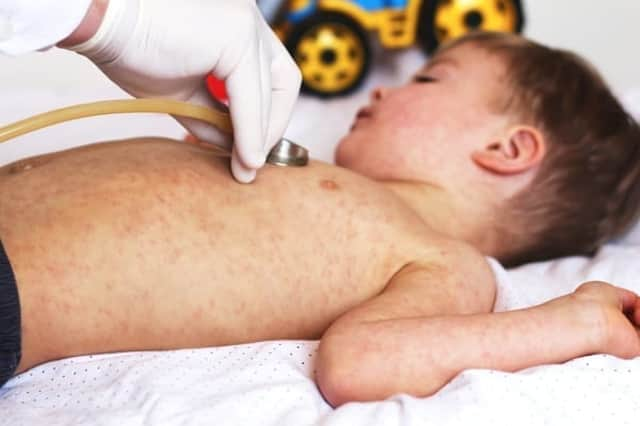These are the warning signs of measles you need to know about


Measles is a highly infectious viral illness, which can sometimes lead to serious complications.
Although it is now uncommon in the UK due to the effectiveness of vaccination, it can prove unpleasant if contracted.
Who can get measles?


Advertisement
Advertisement
The NHS notes, “Anyone can get measles if they have not been vaccinated or have not had it before, although it's most common in young children.”
What are the symptoms of measles?
The initial symptoms of measles develop around 10 days after you're infected, and can include:
cold-like symptoms, such as a runny nose, sneezing and a coughsore, red eyes that may be sensitive to lighta high temperature (fever), which may reach around 40C (104F)small greyish-white spots on the inside of the cheeks
A red-brown blotchy rash will then appear a few days later, and usually starts on the head or upper neck before spreading outwards to the rest of the body.
How long does the infection last?
Advertisement
Advertisement
Although unpleasant, measles usually passes in around seven to 10 days without causing any further problems.
Once you have had measles, your body then builds up resistance to the virus and it's highly unlikely you'll get it again.
However, in some people it can lead to serious and potentially life-threatening complications, which includes infections of the lungs (pneumonia) and brain (encephalitis).
Measles can be prevented by having the measles, mumps and rubella (MMR) vaccine (Photo: Shutterstock)
When should I see a GP or take my child to see a GP?
Advertisement
Advertisement
The NHS explains that “you should contact a GP as soon as possible if you suspect that you or your child may have measles.
“It's best to phone before your visit as your GP surgery may need to make arrangements to reduce the risk of spreading the infection to others.”
You should also see a GP if you have been in close contact with someone who has measles and have not:
been fully vaccinated with two doses of the MMR vaccinehad the infection before
You should do this even if you do not have any symptoms.
How can I prevent measles?
Advertisement
Advertisement
Measles can be prevented by having the measles, mumps and rubella (MMR) vaccine, which is given in 2 doses as part of the NHS childhood vaccination programme.
The first dose is given when your child is around 13 months old, and a second dose is then given at 3 years and 4 months.
Adults and older children can also be vaccinated at any age if they have not been fully vaccinated before - ask your GP about having the vaccination.
If the MMR vaccine is not suitable for you, then a treatment called human normal immunoglobulin (HNIG) can be used if you're at immediate risk of catching measles.
This article was originally published on our sister site, Yorkshire Evening Post.